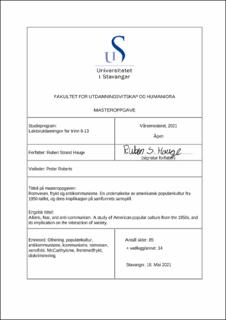| dc.contributor.advisor | Roberts, Peder | |
| dc.contributor.author | Hauge, Ruben Strand | |
| dc.date.accessioned | 2021-09-03T16:34:04Z | |
| dc.date.available | 2021-09-03T16:34:04Z | |
| dc.date.issued | 2021 | |
| dc.identifier | no.uis:inspera:80599373:9950960 | |
| dc.identifier.uri | https://hdl.handle.net/11250/2773507 | |
| dc.description.abstract | Denne masteroppgaven utforsker Othering funnet i amerikansk populærkultur fra 1950-tallet.
Oppgaven analyserer film og tegneserier fra tiåret i håp om å etablere en generalisering
innenfor de utenomjordiske vesens tilknytning til kommunister. Oppgaven tar utgangspunkt i
12 filmer og 13 tegneserier, og foretar en kvalitativ innholdsanalyse av empirien forankret i
relevant teori. Masteroppgavens teoretiske rammeverk bygger opp under problemstillingen og
forskingsspørsmålene. Disse spørsmålene belyser temaet og fungerer som oppgavens
strukturelle grunnmur. For å svare på disse belyses ulike aspekter ved de sosiale, politiske og
kulturelle forholdene i USA på 1950-tallet. Dette inkluderer blant annet de fundamentale
aspektene ved Othering, antikommunisme og hvordan populærkultur fremmer et budskap.
Kommunister ble fremstilt som utenomjordiske, men også på lik linje med dem i filmer og
tegneserier fra 1950-tallet. Denne oppgaven ser nærmere på hvorfor dette oppstår, samt
hvordan dette påvirker samfunnets sosiale samspill. Oppgaven ser også nærmere på hvordan
historiske hendelser gjenspeiles i filmer og tegneserier.
USA var i løpet av den kalde krigen under signifikant press fra Sovjetunionen. Den
østlige stormakten ble etter andre verdenskrig den største trusselen til vestens frihet. Frykt
preget den vestlige verden, og kanskje spesielt USA. Denne frykten ble en del av
populærkulturen på 1950-tallet hvor den gjenspeilet samfunnets bekymringer. Landets
politiske organ forsterket disse bekymringene gjennom strategisk manipulering. Menn som
blant annet Harry Truman og Joseph McCarthy forsøkte å begrense Sovjetunionens
ideologiske utbredelse internasjonalt, men også nasjonalt. Kommunister ble gjennom blant
annet taler, propagandaplakater og populærkultur fremstilt som det betydelige onde. Disse
fremstillingene var av en diskriminerende natur, og forankret i frykt. En slik diskriminering er
hva som blir definert som Othering i denne oppgaven. Othering fant sin vei inn i
populærkulturen som en måte å undergrave den kommunistiske autoritet. Samtidig bidro det
til en misoppfatning av vestens forhold til det kommunistiske. En oppfatning som var
forankret i en stereotypisk mening om at alt som var kommunistisk var enten uskikket eller
farlig. Denne masteroppgaven ser nærmere på hvordan denne oppfatningen slo rot i USA på
1950-tallet, hva som lå til grunn for den, samt hvilke konsekvenser den fikk. Omfanget av
populærkulturens signifikante rolle under den kalde krigen er essensiell for å forstå forholdet
mellom USA og Sovjetunionen. | |
| dc.description.abstract | This master's thesis examines Othering found in American popular culture from the 1950s. It analyzes films and comics from the decade in the hope of establishing a generalization within the alien beings' connection to communists. The thesis is based on 12 films and 13 comics and performs a qualitative content analysis of the empirical data rooted in relevant theory. The theoretical framework builds on the research questions. These questions shed light on the topic and serve as the thesis' structural foundation. To answer these, various aspects of the social, political, and cultural conditions in the United States in the 1950s are highlighted. This includes the fundamental aspects of Othering, anti-communism and how popular culture promotes a message. This message is expressed through popular culture and its representations. Communists were portrayed as extraterrestrial, but also on par with them in 1950s movies and comics. This thesis takes a closer look at why this occurs, as well as how this affects society's social interactions. The thesis also takes a closer look at how historical events are reflected in films and comics.
During the Cold War, the United States was under significant pressure from the Soviet Union. After World War II, the Eastern superpower became the greatest threat to the Western civilization and its freedom. Fear marked the Western world, and perhaps especially the United States. This fear became part of popular culture in the 1950s where it reflected society's concerns. The country's political body reinforced these concerns through strategic manipulation. Men such as Harry Truman and Joseph McCarthy sought to limit the ideological spread of the Soviet Union internationally, but also nationally. Through speeches, propaganda posters and popular culture, communists were portrayed as the significant evil. These representations were of a discriminatory nature and rooted in fear. Discriminations such as this is what is defined as Othering in this thesis. Othering found its way into popular culture to undermine communist authority. At the same time, it contributed to a misconception of the West's relationship to the Communist. A view that was rooted in a stereotypical opinion that everything that was communist was either wrong or dangerous. This master's thesis takes a closer look at how this perception took root in the United States in the 1950s, what was the background for it, and what consequences it had. The extent of the significant role of popular culture during the Cold War is essential to understanding the relationship between the United States and the Soviet Union. | |
| dc.language | nob | |
| dc.publisher | uis | |
| dc.title | Romvesen, frykt og antikommunisme. En undersøkelse av amerikansk populærkultur fra
1950-tallet, og dens implikasjon på samfunnets samspill. | |
| dc.type | Master thesis | |
